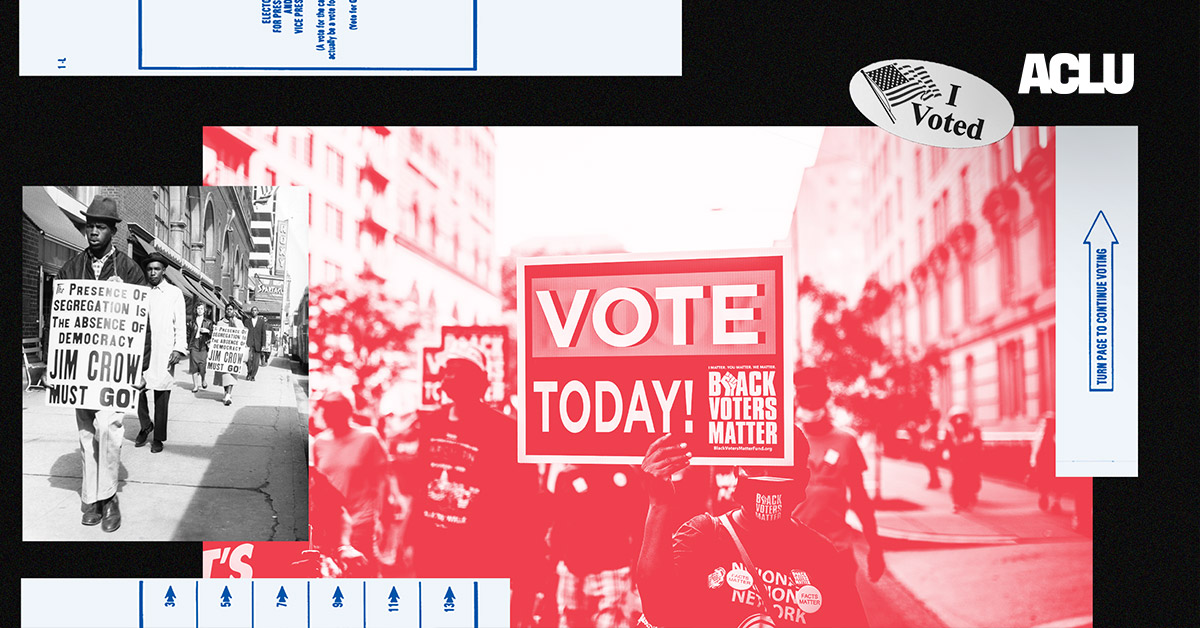After Ronald Miller registered to vote in 2020, the State of Florida sent him a voter information card in the mail. Mr. Miller did not find out that a prior felony conviction made him ineligible to register or vote until, in 2022, Florida state officers arrested him. Now, Mr. Miller is one of several returning citizens that Florida’s Office of Statewide Prosecution (OSP) is prosecuting for making what appear to be good-faith mistakes about their voter eligibility. Rather than helping their citizens understand Florida’s complicated voter eligibility rules, the State has instead resorted to these intimidating, anti-democratic prosecutions.
Today, we — along with our partners at the ACLU of Florida, the NAACP Legal Defense Fund, and the Brennan Center for Justice — filed an amicus brief in Mr. Miller’s case highlighting OSP’s unlawful prosecution against Mr. Miller and other returning citizens in Florida, which disproportionately implicate Black citizens.
Florida’s System for Voting Rights Restoration: An “Administrative Train Wreck”
In 2018, Florida voters passed Amendment 4, which aimed to permanently end felony disenfranchisement in the state and restored voting rights for returning citizens who had completed the terms of their sentences. That amendment would’ve restored the right to vote for an estimated 1.4 million people. But, the following year, Florida’s legislature passed a new law requiring returning citizens pay off certain fines and fees before they can regain their right to vote. The ACLU and our partners challenged Florida’s pay-to-vote system for returning citizens, but were ultimately unsuccessful.
Now, in the words of one federal court, Florida’s system of rights restoration for returning citizens is an “administrative train wreck.” Florida has essentially abdicated its responsibility to returning citizens in the state, refusing to provide meaningful guidance to individuals looking to navigate this byzantine system and figure out if they are eligible or not. When a registrant is ineligible, that should be flagged by the state before the person mistakenly casts a ballot, but Florida hasn’t consistently provided registrants with that clarity. In many cases, Florida has misled its citizens about their voter eligibility, including by sending them voter information cards in the mail.
And after telling multiple federal courts that returning citizens who made good-faith mistakes about their voter eligibility need not fear prosecution, the State has instead decided to prosecute nearly two dozen individuals for what appear to be honest mistakes. Fifteen out of the 19 returning citizens being prosecuted by OSP are Black.
Florida’s Statewide Prosecution: An Unbounded Expansion of Authority
Because Florida’s system for knowing whether you’re eligible to vote is so confusing, some of Florida’s local state attorneys have declined to prosecute people who try to register or vote while mistakenly thinking they’re eligible to do so. And for good reason: Voting while ineligible is a crime in Florida, but only when someone knows they’re ineligible and purposefully decides to vote anyway. People like Mr. Miller who don’t know and are never told they’re ineligible, and try to vote, aren’t guilty of a crime. That’s why, for example, one local prosecutor last year decided not to prosecute some people in a similar situation.
But just before a major election in 2022, Gov. Ron DeSantis announced OSP’s arrests of 19 returning citizens — including Mr. Miller — for allegedly voting while ineligible in 2020. He called those arrests the “opening salvo” of his state government’s efforts to prosecute voting where local prosecutors hadn’t. OSP, however, only has authority to prosecute crimes that happen in multiple judicial circuits. Registering to vote or voting while ineligible, of course, happens only in one location. So, several state courts have dismissed the charges against Mr. Miller and some other returning citizens, finding that OSP didn’t have authority to bring the prosecutions. The State has appealed the dismissal.
Our amicus brief, filed before Florida’s intermediate appellate court, argues that the OSP doesn’t have the power to prosecute Mr. Miller. That’s because it was created to go after organized, complex, criminal conspiracies that are hard for one local prosecutor’s office to handle alone. The legislators who authorized OSP didn’t intend for it to wield its power to prosecute people like Mr. Miller, who vote or register because of a good-faith mistake. Instead, they were careful to give it a limited authority over only some kinds of crimes and not to usurp the discretion of local prosecutors. The State’s argument — that registering and voting occurs throughout the state as a whole, so any voting offense is a statewide crime — blows up that balance entirely. Under that theory, the OSP would have prosecutorial power over almost any offense. The State, in other words, wants OSP to have boundless authority.
Confusion and Fear Among Black Voters
Florida’s attempt to assert free reign to carry out unjust voter prosecutions, instead of fixing its registration system, is just one of many ways it has tried to chill and suppress the votes of Black people in the state. In Florida, one in eight Black people are disenfranchised, twice the rate of non-Black people. Nationwide, Black people are more likely to face jail time for voting violations. Knowing that any simple mistake on a voting form could lead to a prosecution has already made many eligible voters afraid to vote.
These arrests and prosecutions, in other words, are another dramatic attempt at suppressing votes in Florida, particularly for Black citizens. The ACLU and our partners are committed to combatting these shameful prosecutions that work to endanger our democracy.
Published September 26, 2023 at 10:31AM
via ACLU (https://ift.tt/MvAcYbh) via ACLU


